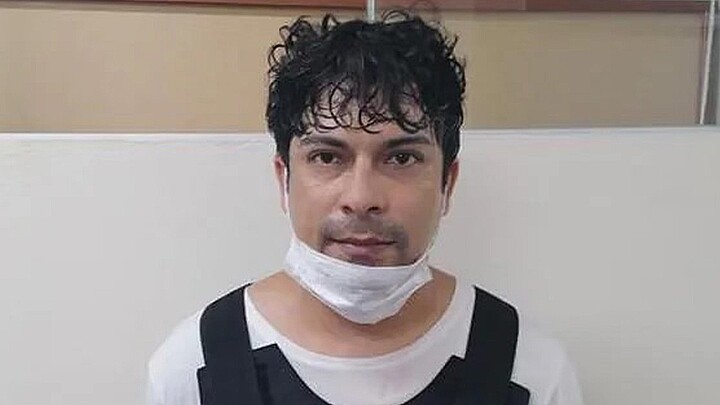Crime
Peru discusses chemical castration for rapists after 'Chiclayo Monster' case
The country continues to be shocked by the confession of a cab driver who admitted to kidnapping and sexually abusing a 3-year-old girl
April 20, 2022 4:31pm
Updated: April 21, 2022 7:36pm
In Peru, chemically castrating rapists is an issue that is currently being debated this week after the nationwide impact of the case of the "Monster of Chiclayo," a cab driver who confessed to kidnapping and sexually abusing a three-year-old girl.
Peruvian President Pedro Castillo, of the radical leftist Peru Libre party, announced on April 18 that he will present a bill in the next few days to chemically castrate those found guilty of rape.
"We are proposing the application of chemical castration as one of the drastic measures against rapists of minors, adolescents, and women; a proposal that will be formalized in the next few days, and we hope that Congress will not turn its back on a popular clamor," said Castillo.
Premier Anibal Torres said this week that chemical castration "will be debated in the Council of Ministers and in Congress. We have to fight crime, and these are atrocious crimes that we cannot continue to allow.”
Juan Antonio Enriquez Garcia confessed last week that he kidnapped a minor girl in the city of Chiclayo, held her captive, and tied her up with duct tape for 15 hours until National Police officers found her in a house belonging to the accused.
Peruvians took to the streets for several days in different cities around the country to demand "Justice for Damaris" and to demonstrate that "Girls should not be touched." In the protests and digital forums, there were repeated calls for life imprisonment, and even the death penalty, for Enriquez Garcia, who was taken to "preventive detention" for nine months while the investigation progresses.
The girl is stable and recovering after undergoing a reconstructive surgery last Thursday due to damage from sexual abuse, reported the Peruvian Social Health Insurance, EsSalud.
Chemical castration allegedly reduces sexual desire and activity utilizing drugs. Although it is a legal punishment in countries such as Poland, the Czech Republic, South Korea, and some U.S. states, the human rights organization Amnesty International considers it a "cruel and inhumane" punishment.
A populist campaign?
After the announcement of the Executive to promote chemical castration, Castillo faced criticism. Congressman José Williams (from Avanza País) said that it makes no sense to apply the measure if the aggressor is sentenced to life imprisonment.
"I do not know how far it can be good to chemically castrate a person who has already been sentenced to life imprisonment. That person is not going to get out... Those people should never get out of prison and they should be educated about it as well. They should be punished, and taught so that this unfortunate event that happened in Chiclayo does not happen," said Williams, according to information from La República.
Omar Awapara, director of the Political Science program at the Peruvian University of Applied Sciences (UPC), and political scientist Paula Távara, claim that proposing chemical castration for rapists is one of the messages issued by the leftist government to distract attention from questions about its administration.
Paula Távara told the newspaper El Comercio that the announcement shows that there is no policy on sexual violence. In addition, the political scientist warned that this type of message from President Castillo "is a sign of disrespect towards the citizens. Chemical castration is a project that the president knows will go nowhere. It is an insult to the families who are waiting for justice."
Awapara believes that these announcements take "the focus of the public discussion towards these issues and pushes it away… There is a high level of social conflict and an unfortunate event, such as what happened in Chiclayo, opens the possibility of distraction for the government," added the expert.
Former Minister of Women and Vulnerable Populations Gloria Montenegro believes that "neither the death penalty nor castration has shown that violence rates have decreased in the country where these [punishments] are allowed."
However, she believes that the penalties for rapists should be more severe, and the justice system should not hesitate to apply them. "In 2018, the law was changed so that rape of minors led to life imprisonment, these crimes do not expire and do not have benefits. That must be reinforced," the former minister told RPP Noticias.
Carlos Caro, a criminal lawyer, told CNN en Español that chemical castration is a proposal that has been debated in Peru since the 1990s, but has not been approved because of two problems. "The first has to do with a constitutional issue. Corporal punishment in Peru is prohibited and chemical castration would amount to a corporal punishment that would violate the dignity of the person."
Peru has signed the American Convention on Human Rights, known as the Pact of San José, which states that "all persons deprived of their liberty shall be treated with respect for the inherent dignity of the human person."
"The second problema… has to do with the efficacy of the measure, which is in question for the medical field, in the sense of knowing if it can effectively reduce sexual libido or the incidence of sexual crimes when this type of substances are applied," added the lawyer.
According to the President of the Peruvian Network Against Child Pornography, Dimitri Senmache, sexual abuse of minors is the second most committed crime in Peru, surpassed only by aggravated theft.
From January to October 2021, more than 12,828 cases of sexual violence in children and adolescents from zero to 17 years of age were handled at the Women's Emergency Centers (CEM), according to the Aurora Program of the Ministry of Women and Vulnerable Populations.










